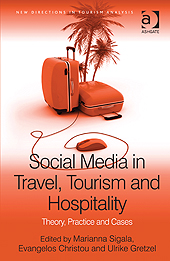 Social Media in Travel, Tourism and Hospitality, Theory, Practice and Cases
Social Media in Travel, Tourism and Hospitality, Theory, Practice and Cases
Edited by Marianna Sigala, University of the Aegean, Greece, Evangelos Christou, Alexander TEI of Thessaloniki, Greece and Ulrike Gretzel, University of Wollongong, Australia
Ashgate, ISBN: 978-1-4094-2091-0, February 2012
In more ways than one, the Web itself has gone all the way from a boring collection of hyperlinks to one giant, vibrant, revolutionary perhaps, social medium. Although everyone talks about the growing importance of social media in most economic sectors and particularly in Tourism, a labour-intensive sector, and there have been a number of journal articles, no one had taken the initiative before to assemble theoretical wisdom and practical knowledge in an academic book, indeed a one constituting a high-quality, collective effort. This edited collection was produced by a small army of contributors, academics and practitioners (34) from over 10 countries. The three editors and most of the contributors are leading academic experts in tourism ICT and marketing, while there are also contributions from a number of leading marketing & e-business practitioners and other social media 'evangelists'.
It is split in 4 parts: strategic and operational business models, applications for marketing, travellers' behaviour, knowledge management and market research. The underlying ideology is a marketing one, so the focus is on evaluating the range of available tools and their adoption by different organisations as well as consumers or pro-sumers. Broader political issues such as Web 2.0 ownership, concentration and control or why did it develop are not tackled by the contributors, understandably so as it would take another volume. There are many useful tables and figures but, surprisingly perhaps, no photos of websites applying social media.
Although this is clearly an academic book which dedicates plenty of space on definitions, literature reviews and theoretical concepts and authors honestly acknowledge the limitations of their research and the interim, patchy and ambivalent nature of many findings, it should also be attractive to leading practitioners as it contains characteristic and informative case studies such as those on the use of Web 2.0 by Wine Tourism networks, the Glasgow's Merchant City Tourism & Marketing Cooperative, by Europe's National DMOs and the MICE industry. Other interesting research chapters include ch. 11 which explores the impact of Web 2.0 in increasing transparency about Hotel prices, ch. 18 which tries to measure the effect of e-reviews on prospective agro-tourists in Germany, chapter 21 which reviews automatic ways of analysing blog content for competitive advantage and ch. 22 which investigates how city destinations monitor social media.
Reading the book also generates many interesting questions. The mantra of Web 2.0 evangelists is that users trust other users rather than marketing departments. They then set out to teach marketing departments ways on how to encourage users or to behave or pose like users. All this contains many delightful ironies. There is no doubt that social media is increasing in importance and impact in the tourism industry, however, how important is it really and can its contribution be measured or quantified? Will Web 2.0 perhaps be a distant memory a few years from now due to further technological advances, or due to excessive noise or even saturation? Are "friends" friends, do "likers" really "like"? Are you really "linked" to 5 million professionals when you cannot get a job for 2 years? How many customer reviews are genuine and not encouraged or malevolent (by a competitor)? Is there something orwellian or perhaps ionescian about this situation? Does it make people and organisations more sociable / responsible or quite the opposite? Why is there no (official at least) "dislike" button - the equivalent of giving a bad review at a tourism-review website? Use of Web 2.0 is not an end in itself, it is just a tool, suitable for some, and for some uses. And is it all based on a sound (presumably advertisement-based) business model or does it slowly cannibalise all the media, communication and online sectors and it will someday come tumbling down as a huge pyramid scheme? What is the socioeconomic and political impact of the rise of a handful of, corporately-owned, social media giants? has Web 2.0 made the playing field more level for small (by providing free promotion tools) independent players, or the opposite?
Even though the Web and Web 2.0 in particular is a fast moving world, this volume is suitable as a textbook reference for academic students of tourism marketing; it is also useful for tourism marketing & promotion professionals and web professionals. Suitably, an ebook version of the book is available. Due to its very topic a (social media!) edition accompanied with multimedia containing (or hyperlinks to) interactive case studies would further increase its usefulness, as would a fifth part critically evaluating deeper, big-picture issues and ideally - but this would be very difficult due to competition & privacyissues - perhaps a chapter dealing with measuring economic sustainability and performance - which Web 2.0 strategy works best for whom, backed with the ever-elusive hard data.
